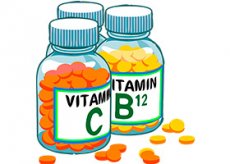New publications
Are vitamin and mineral preparations useless?
Last reviewed: 02.07.2025

All iLive content is medically reviewed or fact checked to ensure as much factual accuracy as possible.
We have strict sourcing guidelines and only link to reputable media sites, academic research institutions and, whenever possible, medically peer reviewed studies. Note that the numbers in parentheses ([1], [2], etc.) are clickable links to these studies.
If you feel that any of our content is inaccurate, out-of-date, or otherwise questionable, please select it and press Ctrl + Enter.

Scientists representing the University of Toronto and Saint-Michel Hospital assure that systematic use of vitamin and mineral bioactive preparations in practice does not produce the expected beneficial effect.
Many people try to compensate for the lack of certain substances that we should get from food by taking bioactive preparations. Well-known dietary supplements are usually not clinically tested: many of them have the phrase: "not related to medicines". The turnover of such pseudo-medicines is generally not traceable.
Experts analyzed the findings of previous studies and found that the vast majority of common multivitamin supplements do not provide any real benefit to human health. In addition, there is no evidence that taking vitamin supplements in any way reduces the risk of developing cardiovascular diseases.
The only exceptions are drugs such as folic acid and complex preparations of vitamins belonging to group B: such supplements have proven useful for normalizing the functioning of the nervous system.
"We were surprised to find so few benefits from popular over-the-counter supplements," said study co-leader Professor David Jenkins. "Our work has shown that multivitamins won't do anyone any harm. But they won't do anyone any good either."
In addition, the study revealed that high levels of vitamin B3 and antioxidants in the blood can be a risk factor for premature death. Scientists explain this by the fact that large doses of B3 adversely affect blood sugar levels, and an excess of antioxidants can “break” the body’s natural antitumor defenses.
According to researchers, it is the uncontrolled intake of all kinds of vitamin and mineral supplements that leads to an excess of vitamins and minerals.
Scientists also found that even the widely advertised ascorbic acid does not have any practical benefit for preventing colds. Supplements containing zinc were a much more effective preventive measure: such preparations shortened the period of severe cold symptoms.
"As a result of the fact that we have not noticed any significant positive effects of vitamin supplements, we believe that it is much more reasonable to switch to a healthy diet so that all the nutrients the body needs come directly from food," says Dr. Jenkins.
“We are not aware of a single experiment that could prove that vitamin and mineral supplements provide greater benefits than a complete healthy diet rich in vegetables, fruits, and nuts,” the specialist adds.
The scientists' findings were published in the Journal of the American of Cardiology.
